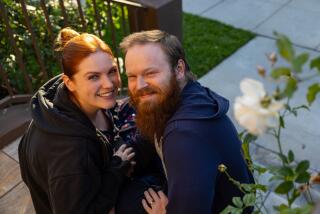First U.S. Septuplets Since 1997 Born in D.C.
- Share via
WASHINGTON — A woman has given birth to the first set of septuplets born in the United States since 1997, after choosing months ago not to “selectively reduce” the number of fetuses she was carrying, doctors at Georgetown University Hospital announced Friday.
The five boys and two girls, born 12 weeks prematurely Thursday night, were all in critical but stable condition because of dangerously low birth weights, ranging from 2.2 to 2.4 pounds, doctors said.
All but one of the babies were breathing with the assistance of ventilators, and one of the boys was being treated for low blood pressure, doctors said. The mother was reported to be in good condition following the caesarean delivery. She and her husband have asked not to be identified.
The Muslim couple decided early in the pregnancy, against the advice of their obstetrician, not to abort one or more of the fetuses. They cited religious reasons as well as the desire to protect both the health of the mother and the fetuses, doctors said.
Still, doctors are cautiously optimistic about the prospects of the septuplets, whose names are being withheld at the family’s request.
“We are not out of the woods yet . . . [but] it is a great start,” said Dr. Craig Winkel, Georgetown chief of obstetrics and gynecology, at a news conference. The mother is expected to be released from the hospital within days. The babies will likely need to remain hospitalized for two months, doctors said.
Though doctors declined to address the probability that all seven will survive, they noted that the babies scored well on the Apgar scale measuring the condition of newborns. Each scored from seven to nine out of 10.
“All the internal organs that are supposed to be there are where they should be, but every organ is small,” said Dr. Siva Subramanian, Georgetown’s chief neonatologist.
The mother was treated with fertility drugs, according to Dr. Mutahar Fauzia, the couple’s Falls Church, Va., obstetrician and reproductive endocrinologist. Fauzia, who declined to specify the drugs she administered, said the couple first approached her about fertility treatment in September.
Fauzia said she immediately warned the couple of the therapy’s serious risks and its potential for complications--both to the mother’s health and to the health and development of any children.
“Any patient who enters my doors, I scare them to death,” she said. “I want my patients to know what they’re thinking of doing.”
Seven weeks into the woman’s pregnancy, when Fauzia realized that her patient was carrying seven fetuses, the doctor said she “prayed to God, ‘Please help me. I’ll do my best, but please help me.’ ”
Fauzia, a Pakistani immigrant who is also a Muslim, recommended selective reduction to the couple and told them that they should keep no more than two of the fetuses, but she said the couple’s steadfast religious conviction that human life is a “gift of God” compelled them to refuse.
Then began what Fauzia called an “unimaginably stressful responsibility.” She ordered bed rest 18 weeks into the pregnancy and began multiple daily visits to the couple’s home, equipped with an ultrasound machine to closely monitor the progress of the mother and fetuses. The house calls continued until the woman was admitted at Georgetown three weeks ago.
News of the septuplets’ birth was not welcomed by Dr. Louis Keith, a leading expert on multiple births and president of the Northwestern University-affiliated Center for Study on Multiple Births.
Keith called the birth “nothing short of disastrous,” saying that the babies may not survive, and, even if they do, “there’s a great likelihood that they will have neurological damage or cerebral palsy.”
“This is a lifetime sentence for these parents,” Keith said. “This is not a triumph of medicine.”
In addition to the potential health hazards faced by multiple-birth babies, Keith stressed the enormous financial burdens of caring for and raising so many children.
However, Patti Beemer, executive vice president of the nonprofit National Organization of Mothers of Twins Clubs, said that corporations and groups like hers will offer the family a combination of community and financial support.
“There will definitely be a strong network of support,” Beemer said.
Still, Keith said, the help may not prove to be enough. “I don’t think that that’s the way to plan your family, to subsist for 21 years on the donations of the public,” he said, laying the blame for high-number multiple births with “an industry that has grown around fertility drugs.”
While the family did not comment publicly, the father of the last set of septuplets born in the U.S. said that he imagines the parents are experiencing “an overwhelming feeling of disbelief.”
“For us, reality hit the day of the birth,” said Kenny McCaughey, whose wife, Bobbi, gave birth to septuplets in Iowa on Nov. 19, 1997. “When you actually see all seven of them coming out, it’s like, ‘Oh, my! Is this really happening?’ ”
The McCaughey septuplets were joined by a Saudi woman’s septuplets in 1998 as the highest-order multiple births in the world in which all the babies have survived.
Kenny McCaughey said his family depended heavily on the wave of public support their high-profile case brought them. “Honestly, who knows where we would be today” without the donations and help that flooded in, he said.
McCaughey said his four boys and three girls are well and mostly healthy. Two, Nathan and Alexis, suffer from muscular weakness and walk with the aid of walkers. Alexis is also on feeding tubes.
More to Read
Sign up for Essential California
The most important California stories and recommendations in your inbox every morning.
You may occasionally receive promotional content from the Los Angeles Times.













